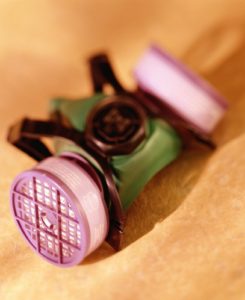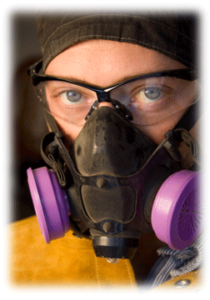Respirator Fit Testing Services
 OSHA’s Respiratory Protection Standard requires companies to protect employees from inhalation hazards posed by overexposure to harmful airborne gases, vapors, dusts, and aerosols. If feasible, this must be accomplished by the implementation of engineering and administrative controls. When these types of controls are not feasible or do not reduce air contaminants to below acceptable levels, employees must be required to wear respirators.
OSHA’s Respiratory Protection Standard requires companies to protect employees from inhalation hazards posed by overexposure to harmful airborne gases, vapors, dusts, and aerosols. If feasible, this must be accomplished by the implementation of engineering and administrative controls. When these types of controls are not feasible or do not reduce air contaminants to below acceptable levels, employees must be required to wear respirators.
Before an employee can be permitted to wear an air purifying or supplied air respirator with a tight-fitting facepiece, they must be medically approved and cleared, and pass classroom training and a fit test.
A respirator fit test is a procedure to either qualitatively or quantitatively evaluate the fit of a respirator to ensure a proper face-to-facepiece seal. Both qualitative and quantitative methods have advantages and disadvantages.
Qualitative (pass or fail) test methods are performed by hand pumping irritant smoke, banana oil or saccharine around the face-to-facepiece seal. This method is relatively inexpensive, fast and easy to perform. The disadvantages include variances in individual responses to the smell or taste of the test agents, and subjective responses when leakage occurs.
 Quantitative (numerical measurement of leakage) test methods are performed by attaching a respirator to a machine that measures the amount of leakage around the face-to-facepiece seal. This method is not subjective, and provides a hard copy printout of the test results. The disadvantages include the high cost of purchasing and maintaining the test equipment, and the high fit factor calculated by the software that may lead to a false sense of security.
Quantitative (numerical measurement of leakage) test methods are performed by attaching a respirator to a machine that measures the amount of leakage around the face-to-facepiece seal. This method is not subjective, and provides a hard copy printout of the test results. The disadvantages include the high cost of purchasing and maintaining the test equipment, and the high fit factor calculated by the software that may lead to a false sense of security.
Total Environmental & Safety, LLC (Total) offers complete respiratory protection compliance, including both quantitative and qualitative respirator fit testing. Total uses state of the art equipment, and will conduct on-site evaluations and testing. Total provides reliable cost effective approaches for all your respiratory protection needs.
Additional supporting services provided by Total:
- Safety Audits and Inspections
- Program Development and Implementation
- Employee Training
- Indoor Air Quality Testing
- Chemical and Waste Management


